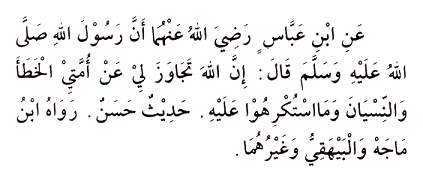On the authority of Ibn Abbas (RadhiyAllahu ‘anhuma), that the Messenger of Allah (SallaAllahu ‘alayhi wasallam) said:
Verily Allah has pardoned for me my ummah: their mistakes, their forgetfulness, and that which they have been forced to do under duress.
[Hasan hadith reported by Ibn Majah, Al-Bayhaqi, and others]
Brief Commentary:
- Strongest opinion is that the phrase “for me” is not part of the hadith but it is an inclusion by the narrator
- This hadith establishes the principle that the religion came to remove harm and establishes the special virtues given to this nation, as the previous nations were held accountable for everything that they do
- Ibn Al-Haithamy said this hadith encompasses half of this religion, maybe all, because the actions we do are either intentional or not, and the literal meaning says we are not accountable in these situations (unintentional) and the implied meaning suggests we are held accountable otherwise (intentional)
- This hadith is important in knowing what to do in these situations, especially in fiqh
- Imam Al-Nawawi may have put it here to humbly say/request that Allah forgives his shortcomings in compiling this collection
- Though Allah forgives us, it is not a must on Him to do so as He chose to do so, so this should make us fear Him more, as He is capable of treating us like He treated the previous nations
- Overlooking for forgetfulness, mistakes, and actions under duress depends on the rights of the affected person(s). Rights in Islam are related to three categories:
- Rights of Allah: Sins are overlooked in the perspective of the sin itself, sometimes consequences and worldly rulings too e.g. you are forced to utter kufr; you are not in sin and are not treated as a kafir
- Community: Sins are overlooked but the worldly punishment is implemented
- Individual: Sins are overlooked and it depends on individuals if they forgive you or not
- Al-Sa’di said, “If someone makes a mistake in what they are commanded to do then it is not overlooked in the dunya sense (i.e. they must do it again properly), but if they make a mistake in what they are prohibited from doing, then it can be overlooked”
- Mistakes in Aqeedah or fiqh can also be overlooked
- We should always look at the consensus and opinion of the overwhelming majority of the pious predecessors of this nation and use that as our basis in determining right from wrong
- Forgetfulness is when you know the ruling but you forget at the time of carrying out the action. Again, when it comes to the rights of the community and individuals, even if you forget, you are still held accountable by them if they don’t forgive you
- When it comes to doing actions under duress, the person who forced you must have the ability to enact what he threatened to do, otherwise it is not considered that you were forced to do the action
- The person who is being forced to do the action must:
- Not be content with the action
- Lack the capability of repelling the person forcing him
- It differs from person to person what a valid threat is depending on their ability, whether they can bear it or not. (Shafi’ee opinion, which seems strongest)
- Not everything we are coerced to do is acceptable:
- Uttering a statement of kufr: There is consensus that you can do this as long as you have Iman in your heart
- Action of kufr: Difference of opinion, but the strongest opinion is that it is the same as uttering statement of kufr
- Killing someone: There is consensus that you can’t do this. Every believer has an equal right to live so you cannot take someone’s life to save another’s
- Doing a haram action to keep the better good: It is obligatory for you to do this, as it is a concession from Allah
Benefits and Action points:
- Praise Allah for overlooking mistakes, forgetfulness and coercion from actions carried out by this nation
- Always seek forgiveness from individuals when you wrong them, even if it is unintentional as they may not forgive you and seek retribution on the day of judgement
- Whenever wanting to know the correct opinion on a matter, look at what the pious first nations agreed upon and ensure the opinion you follow falls into their agreement even if they differed e.g. they differed between A & B, so ensure you fall into either A & B as they agreed it is between those two opinions only
- Do not carry out an action and claim you were forced to do it when the person forcing you is weaker than you or cannot carry out his threat, or threatens you with something bearable
- If you are forced to do something, ensure you are always discontent with it in your heart
- When there is no textual evidence advising you what to do, then look for the overall benefit and act upon it

This was a very expounding Hadith. Praise be to Allah that he carries and forgives me more then I deserve. Alhumdulilah Rabil Alamin for this precious gift of mercy Amin.